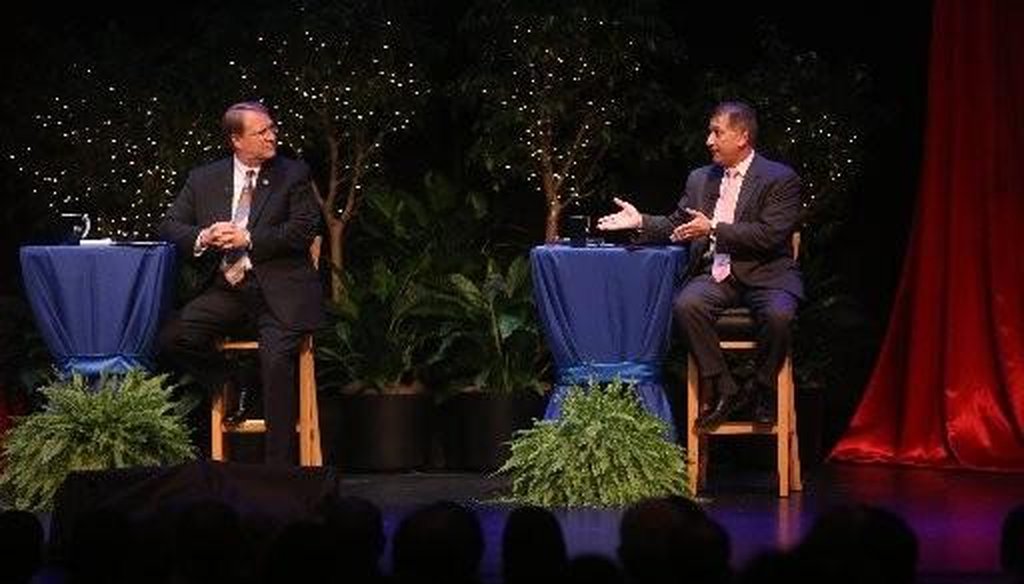

Our only agenda is to publish the truth so you can be an informed participant in democracy.
We need your help.


Mayor Bill Foster and challenger Rick Kriseman faced off in the Tampa Bay Times/Bay News 9 mayoral debate on Oct. 15, 2013. Photo by Chris Zuppa | Tampa Bay Times.
Candidates for St. Petersburg mayor painted two very different portraits of the city’s economy during the Tampa Bay Times/Bay News 9 debate Oct. 15.
Mayor Bill Foster touted the city’s unemployment rate, which he said is lower than the statewide average. Challenger Rick Kriseman countered by saying fewer people are working.
"Unfortunately, since Mr. Foster's been mayor, we have less small businesses in the city of St. Petersburg," Kriseman said, "and there are less people employed in the city of St. Petersburg than there were prior to his taking office."
We decided to put both candidates’ claims to the Truth-O-Meter. (We checked Foster's claim here and Kriseman's claim about fewer businesses here.) In this check, we’ll examine Kriseman’s line about fewer people working in St. Petersburg than before Foster took office.
Kriseman’s statement was a little perplexing.
The jobs picture for the nation has improved in recent years, and the same goes for the state. Wouldn’t St. Petersburg logically follow that trend?
In short, it does.
Bureau of Labor Statistics employment data for the city of St. Petersburg, rough as they may be, do not support Kriseman’s point. The numbers are taken from the government’s monthly survey of 60,000 households.
Foster took office in January 2010, several months after the recession officially ended in June 2009.
When Foster took office, just over 103,000 St. Petersburg residents were working -- lower than it had been in any point since at least 2003, according to BLS data.
But the most recent federal data for July 2013 show the number of people with jobs is up over 115,000. State data offer a more up-to-date figure, showing 116,127 employed residents for August. Granted, that’s still short of the size of the city’s workforce pre-recession. But it’s certainly not a reduction from when Foster took office.
Raymond James chief economist Scott Brown cautioned these figures are not consistent or fixed to match trends in population, "but in general, you would expect to see some improvement because we tend to mirror the national and state economy."
University of Central Florida economist Sean Snaith agreed.
"At the city level, especially St. Petersburg, little places like that are just slots in the overall economic cycle," Snaith said. "They’ve just got to ride what’s happening. They’re not going to be able to buck global and national swings that are just incredibly dramatic as they were in this cycle."
We rate his statement False.
Series data for St. Petersburg from the Bureau of Labor Statistics (Google doc)
Interview with Scott Brown, Raymond James chief economist, Oct. 16, 2013
Interview with Sean Snaith, University of Central Florida professor and director of the Institute Economic Competitiveness, Oct. 16, 2013
Interview with Stanley Smith, director of population studies at the University of Florida’s Bureau of Economic and Business Research, Oct. 16, 2013
Interview with Jessica Sims, Florida Department of Economic Opportunity spokeswoman, Oct. 16, 2013
Interview with Timothy Ewing, Bureau of Labor Statistics researcher, Oct. 17, 2013
In a world of wild talk and fake news, help us stand up for the facts.
